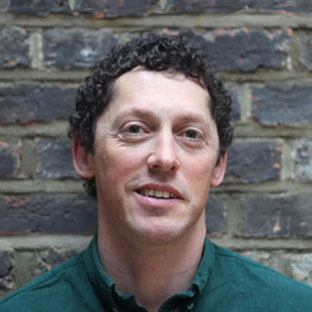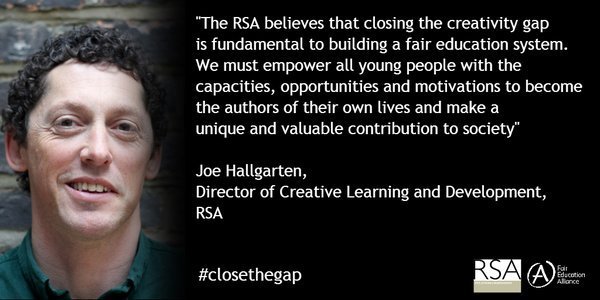After more than twenty years of working in and with schools, this week I’ve moved on in to become interim Director of RSA global. Whilst I’ll still retain a global education remit, building on our recent reports for WISE, the Roosevelt Institute, and the European Council for International Schools, I’ll be taking a welcome and possibly permanent break from Ofsted, SATs, and all those other acronyms that were being invented when I joined the teaching profession in 1992, and look unlikely to disappear any time soon.
My final task in my old role was to write 500 words on RSA’s views about schools and learning that might inform our future work. Boiling our musings into six core beliefs was both torturous and fun. The education world is full – too full – of people who are too sure of their views. If I could ask for one thing for education policy in England, it would be for it to become a more reflective process, where doubt and uncertainty were valued, rather than hidden. So, while retaining the right to change my mind and for my successor to change RSA’s mind, I thought I’d share our thinking, in the hope that it might make a useful contribution to the raging (on Twitter, at least) debates about defining progressive education, and the important launch today of the Fair Education Alliance’s report card.
The RSA believes that everyone should have the freedom and power to turn their ideas into reality – we call this the Power to Create. Through our ideas, research and 27,000-strong Fellowship, we seek to realise a society where creative power is distributed, where concentrations of power are confronted, and where creative values are nurtured.
The power to create is already here; it’s just unevenly distributed. Across the education system, we see creativity gaps widening amongst learners, educators and institutions. The RSA believes that closing these gaps is fundamental to building a fair education system. We must empower all young people with the capacities, opportunities and motivations to become the authors of their own lives and make a unique and valuable contribution to society.
Key outcomes for learners
To develop the power to create in learners, RSA believes that, in addition to achieving well in ways currently valued by our school system, schools should focus on three key outcomes:
- Creativity, defined as the capabilities and dispositions needed to generate new ideas and turn them into action
- Agency, defined as the capacity of an individual to act independently and to make wise choices about life, everyday decisions and relationships
- Wellbeing, defined as a sustainable state of positive attitude, resilience, and satisfaction with self, relationships and experiences
Importantly, all of these outcomes have a collective as well as an individual dimension. They also apply to the development of school staff, and to the school as a creative institution.
Core beliefs
We believe that a focus on these outcomes requires schools to subscribe to six beliefs:
-
Learning should, wherever possible, connect with real-world problems, projects and people that provide sustained opportunities to develop and demonstrate pupils’ creativity, and develop their skills and networks for the future.
-
All pupils should access high quality learning opportunities across all arts and design subjects, and for practical learning beyond these subjects, throughout their school careers, regardless of the qualification choices they make. This connects to RSA’s historical focus on arts, manufacturing and commerce.
-
Pupils should be progressively empowered to make informed choices about their learning (and their qualifications) that are aligned to and expand their interests, aptitudes, and ambitions.
-
Strong pupil voice and leadership should be nurtured in all pupils at all ages, both as intrinsically valuable and as fundamental foundations for high standards of behaviour.
-
Schools should foster deep relationships with the local communities they serve, engaging parents, local employers, voluntary organisations and others education institutions as equal partners. Through these relationships, pupils need their social context and home lives understood, respected and attended to, whilst never used as an excuse for underachievement.
-
Teachers and other school staff should develop as disciplined innovators, whose own creativity, agency and wellbeing are consistently nurtured through collaborative, enquiry-based opportunities to develop new practices and pedagogies.
As I step onto RSA’s global veranda, gin and tonic in hand, I’d welcome any thoughts about these beliefs. They are deliberately designed to be contestable; not every school, parent or policymakers will agree with them. Whilst RSA and others must continue to understand and build the evidence base around these beliefs, we also accept that they are partly values-based, so will never be entirely ‘provable’. So whether your comments are ‘yes but’, ‘yes and’ or ‘no way!’, please bring them on.


Join the discussion
Comments
Please login to post a comment or reply
Don't have an account? Click here to register.
Indeed there are creativity gaps among learners, educators and institutions but will it be possible to close them? It is natural that one person is better at something but the same person is also bad at something else. Well, I'd call it some kind of balance. And no matter how hard we try to teach this person how not to be bad at that something, she or he will never excel at it. Of course, (s)he will be good at it still there will be gaps between this person and the one who is really good at. And what I learned from the research paper writers is that our education system for sure isn't perfect. We need some changed but the ones that will accommodate the needs of each and every kid or adult trying to learn something. And although they provided some ideas I believe this issue is far from being solved. Well, I'm not sure whether what I just wrote is vague but I hope you will get my point of view.
Excellent Joe. Particularly like the the key outcomes for learners.
Buona Fortuna in your new role and enjoy it! I hope you will come to Italy to help me make a global creative difference in my community!
I like the connection to real world problems (1) and wonder if in (5) reference could be made to civil/civic society, to strengthen learning outcomes in a local context?